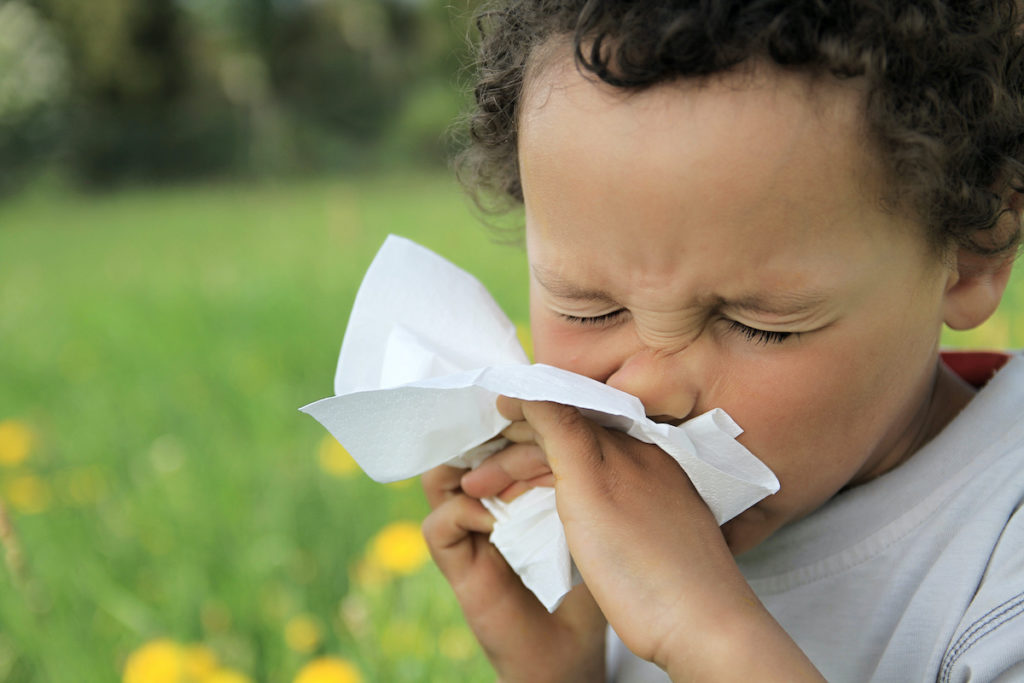
If spring hasn’t already sprung where you live, then it’s just around the corner. While relief from winter weather is usually welcome, some people suffer from the changing seasons. According to the American College of Allergy, Asthma & Immunology, 40% of children are affected by seasonal allergies like hay fever. Common allergens include pollen, mold, and dust mites. If your child is one of the many children who suffer each year, try these tips for managing seasonal allergies.
Tips for Managing Seasonal Allergies
1. Know the Allergy
If your child has allergies, but you aren’t sure of the exact causes, then you may want to talk to the pediatrician about an allergy test. They may be able to do it in the office themselves, or they may refer you to a pediatric allergist. The pediatrician can also determine whether your child is suffering from asthma. Asthma can be the result of an allergy, but it might also have a different cause. This makes a difference when deciding on treatment.
2. Close the Windows
After a winter of keeping windows shut against the cold, you might be tempted to open them and let the fresh air in. If you have a child with springtime allergies, resist that urge. Fresh air is not so great for people who are allergic to pollen and other things it can bring into the house. If you need to combat warmer temperatures, try tip #3.
3. Use Air Conditioning
Use the air conditioner instead of an open window to reduce pollen, mold, and allergens from coming in during warmer months. This is also applicable in the car. Air conditioning cools the air inside in a cycle, so it doesn’t need to pull outside air in.
4. Limit Time Outside to Manage Seasonal Allergies
It’s usually healthy for kids to spend time playing outside. In fact, we often encourage them to spend more time being active in the outdoors. However, that isn’t great advice for a child with seasonal allergies. You don’t have to prohibit them from going outside but limit time outdoors. You can also find tools online that can tell you the levels of certain allergens each day, so you’ll know the best times to stay in and the best times to go out.
5. Change Clothes and Wash Up When Coming Inside
When your child comes inside from playing, have them change into “inside clothes” and put the dirty clothes in the hamper. Then have them wash their face and hands. This prevents them from bringing pollen and other things inside.
6. Wash Linens Frequently
Your child has a lot of contact with their bedding and towels. Dust mites and allergens lurking in linens can irritate. Towels and sheets should be washed at least weekly in hot water to kill dust mites and eliminate pollen or other allergens. You should wash other bedding like blankets and comforters in hot water every 2 to 3 weeks.
7. Replace Pillows
Children spend a lot of face time (literally) with their pillows. Over time pillows will collect dead skin cells, hair, and dust mites. It’s best to replace them every 2 to 3 years. Some pillows can be washed, which may prolong their life.
8. Put Soft Furnishings In Allergen-Proof Covers
If your child is allergic to dust mites or other allergens that live in soft furnishings, consider investing in some allergen-proof covers. You can find various zip-up covers for mattresses, box springs, pillows, and cushions online. Just make sure to follow the care instructions that come with them to keep them allergen-proof.
9. Use the Dryer
Line drying the washing outside might be eco-friendly and good for saving energy, but it’s not ideal for managing seasonal allergies. When your child’s allergies are kicking in, use the clothes dryer to get clothes and linens dry.
10. Take Baths at Bedtime
As we mentioned earlier, having kids wash their hands and face when they come inside is a good way to manage seasonal allergies. Bathing before bed helps prevent kids from spreading the allergens to their pajamas and bedding. Give older kids that bathe themselves a reminder on washing well. Make sure they wash their bodies, faces, and hands rather than just rushing through it.
11. See Your Child’s Pediatrician about Managing Seasonal Allergies
There are many antihistamine medications available to treat seasonal allergies. Some are available over-the-counter (OTC), and some require a prescription. However, it is important to consult your child’s pediatrician before starting any allergy medication, including OTC varieties. Some children may benefit from immunotherapy for their allergies. But the pediatrician or allergist is the best person to determine the best treatment or approve medications.
If you think your child may have an allergy, call our Wake Forest office at 919-556-4779 or our Knightdale office at 919-266-5059 to make an appointment. If your child is having respiratory issues caused by asthma in addition to seasonal allergies, we have an expert team of asthma educators. Together we can find the best plan for managing seasonal allergies for you and your child.




